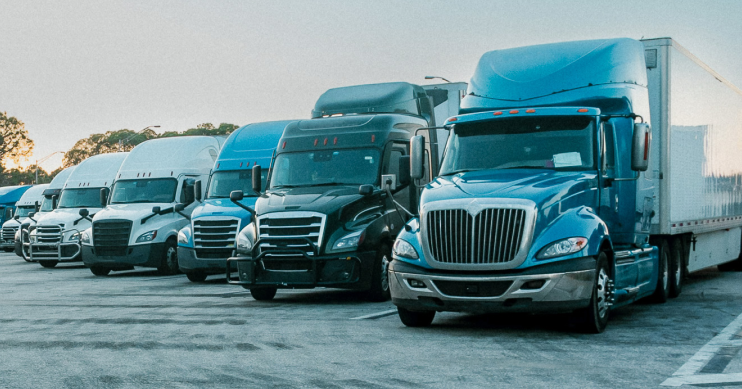- Example active heading
- Example heading
Trucking and logistics businesses are the backbone of the U.S. economy. Demand for these services is high, but growth isn’t always easy.
From buying new trucks to upgrading critical technology, expansion often requires large upfront investments. With the cost of fuel, fleet maintenance, and payroll keeping margins thin, growth can feel nearly impossible without reliable access to capital. An SBA loan may make it easier to scale without draining the cash you need for day-to-day operations.
What are SBA loans?
SBA loans are government-backed loans designed to support small businesses. They’re issued through banks, credit unions, and other approved lenders and partially guaranteed by the U.S. Small Business Administration. This guarantee lowers risk for lenders, which allows them to offer better terms for borrowers. Compared to traditional loans, SBA loans often have lower interest rates, longer repayment periods, and more lenient qualification requirements.
Here are some of the most common SBA loans for trucking and logistics companies.
SBA 7(a) loan
The SBA 7(a) loan is the most commonly used SBA program and is also the most versatile. It can be used for a wide range of business needs, including:
- Commercial truck financing
- Covering day-to-day operations
- Refinancing existing debts
- The cost of adding routes or expanding into new regions
Loan amounts go up to $5 million, with a repayment period of up to 10 years for most uses.
SBA 504 loan
The SBA 504 loan is designed for financing long-term assets, primarily real estate and large equipment. Trucking and logistics companies may use this loan for:
- Purchasing terminals, distribution centers, garages, or other commercial properties
- Making major fleet upgrades
- Purchasing warehouse equipment
- Major facility improvements
504 loans are structured as a partnership between a traditional lender and a Certified Development Company (CDC), which is a nonprofit organization approved by the SBA to support local economic development. The borrower typically makes a 10% down payment, the CDC covers 40%, and the lender finances the remaining 50%. Repayment periods can stretch up to 25 years, and interest rates are typically fixed.
SBA microloan
An SBA microloan is available for amounts up to $50,000, making it more appropriate for smaller funding needs. It’s often used by startups or growing businesses that are not yet able to qualify for larger loans. These funds can be used for expenses such as:
- Equipment repairs
- Safety upgrades
- Insurance costs
- Marketing expenses
- Working capital
Microloans are issued by nonprofit lenders. Terms vary by lender, but repayment terms often stretch up to six years. While the maximum loan amount is smaller, it’s often easier to qualify, making this more accessible than traditional loans.
Smart ways trucking companies use SBA loans to grow.
Due to the longer terms and lower interest rates, many companies use SBA loans to cover ongoing operational needs, rather than simply bridging a cash flow gap. These loans can also help business owners make strategic decisions and invest with greater confidence.
Here are some of the most effective ways transportation companies use SBA loans:
- Fleet expansion: Buying or leasing new trucks to keep up with demand
- Maintenance and repairs: Covering the cost of repairs, upgrades, and replacement parts to keep your fleet operational and compliant
- Fuel costs: Providing the working capital needed to manage spikes in fuel prices.
- Technology upgrades: Investing in GPS systems, electronic logging devices (ELDs), route optimization software, or other logistics platforms
- Staffing needs: Covering the cost of hiring and onboarding new drivers, dispatchers, and back-office support, and keeping up with ongoing payroll obligations
Using SBA loans for both short-term operations and long-term expansion can help companies grow without sacrificing stability.
Benefits of SBA loans for logistics businesses.
SBA loans are one of the most accessible forms of logistics business funding, with terms that often align with the financial demands of running a trucking company. Here are a few of the key advantages.
Lower interest rates.
SBA loans are typically offered at lower rates than conventional loans. Since trucking and logistics companies often need larger loans, the savings can add up quickly.
Lower repayment terms.
It’s common for SBA loans to offer repayment terms of up to 10 years for equipment and working capital, and up to 25 years for real estate. This can make payments more affordable, allowing companies to invest in long-term growth without straining the operations budget.
Flexible use of funds.
While some conventional loans restrict the use of funds, SBA loans are designed for use across multiple parts of a business. For example, one loan could cover the cost of financing semi-trucks, meeting payroll obligations, and investing in compliance technology. This flexibility makes SBA loans especially practical for logistics companies that may have shifting priorities.
Positive impact on credit history.
SBA loans are often more accessible than traditional loans, so companies may get approved even with less-than-perfect credit history. Once the loan is in place, making consistent, on-time payments may help strengthen your business profile. Over time, a stronger credit history may create opportunities for larger financing opportunities or better terms on future loans.
Financial stability in a volatile market.
From fuel to insurance, many of the costs associated with trucking and logistics can fluctuate significantly. SBA loans provide predictable, long-term funding that may help keep business afloat when markets shift. Having financing in place reduces pressure during volatile periods.
How to qualify for an SBA trucking loan.
Getting approved for an SBA loan requires preparation. While each lender has its own criteria, most require the following criteria:
- Credit score: Typically 650 or higher
- Time in business: At least two years, though startups may qualify with a solid plan
- Revenue and cash flow: Ability to prove you can afford loan repayment
- Compliance: A clean record with Department of Transportation (DOT) and industry regulations
You may be able to strengthen the chance of approval by preparing up-to-date financial forecasts, strengthening your business plan, and showing steady demand. Completing an online fundability assessment can help you understand how likely your business is to qualify for financing, and additional steps that may help improve your standing.
Find the right loan for your trucking business.
Lendio’s marketplace provides access to both SBA lenders and alternative financing options with a single application. Compare your options to find the best fit for your business. For non-SBA products, you may secure funding in as little as 24 hours.




.png)


